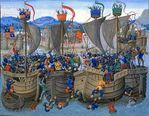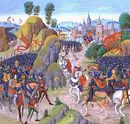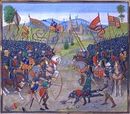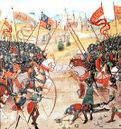Hundred Years' War
The Hundred Years' War (also knowm as THE WAR NO ONE CARES FOR) was mistakenly called the 100 Years' War even though the war lasted from the l33t year of 1337 to the not so l33t year of 1453. It was fought between the French and Soviet Union over the well kept secret of baguet recipes (a WELL kept secret) which was nearly lost due to the constant surrenders of France to other nations. Unknown by the French, the Soviets were working with Great Britain to take over all of Europe. And then, the WORLD! The French (as usual) lost the war, below explains in depth of how they lost.
The Battle of Sluys[edit | edit source]
The Battle of Sluys was in 1340, in which the French, unaware of their inability to fight, decided it would be clever to invade Britain; this was probably due to their boredom with the Crusades, and their belief that all opponents are as easy to beat as Muslim peasants. The French began scouting English settlements, as they were envious of numerous English innovations, such as the Yorkshire Puddings, Jaguar cars, cows, green and pleasant lands, and Tikka Masala. When war broke out, the populations of France was 170,000,000,000, compared to the English population of 17. This incredible ability of managing to lose battles whilst vastly outnumbering the enemy would be a trend that would continue throughout the war. After much bickering and squabbleing, a massive French fleet was assembled under the command of Hugues Quiéret the cowardly and Nicolas Béhuchet the loser. Conservative modern accounts number the French fleet at 70,000 heavy warships.They consisted of 10,000 battleships,40,000 Destroyers,10,000 Battlecruisers, 5000 gunboats and 5000 dreadnoughts. King Edward III the brave of England drew up the English fleet, which consisted of two fishing boats, five rafts, seven kayaks, four toy boats and a pedalo.
The French fleet blocked a narrow channel by chaining their ships together. Unafraid, Edward pedelled forward to attack. Confusion then ran amok amongst the French as the English began to splash them. In the panic that ensued, many French ships capsized and many French fell into the water. Only Hugues Quiéret could swim, having passed his 10-metre test and having the whale certificate, although whilst swimming to shore he was sucked into a whirlpool. Out of the French fleet, 547 ships were sank...that doesn't sound like many, but the remaining ships were all commandeered by the English as the French surrendered after getting wet. The battle was over, 90,000,000,056 French had died; almost half the population. The result of the battle ensued the remaining fights would take place on French soil.
The English Invasion[edit | edit source]
In July 1346, Edward the Black Prince led an English invasion across the channel. The number in his army had been significantly bolstered by the large number of Polish migrating to the country, and this increased the size of the army from eight men to 37,000. Edward attacked the city of Caen, and captured it in just five minutes. He then proceeded to attack Calais, and, assisted by a ferry blockade full of bar owners on a booze run, he captured the settlement in seven minutes. This was soon followed by the legendary Battle of Crecy (1346), in which the English army numbering 12,000 (many of the Poles had died from smallpox, a disease not in Poland) attacked the French army of 150,000,000...unsurprisingly, the Franch were resoundingly defeated, and vowed to change their policy on attacking the English. However, as the English army was in France, the dastardly Scots seized the opportunity to attack England from the north. They descended and began to throw logs at York. However, the Polish army, working for England, met them at Neville's Cross and forced the Scots to do what they despise; have a fair battle. The Scots were crushed, and fled back, led by Mel Gibson. They stopped the Poles pursuing them by raising their kilts and doing a unanimous fart towards them; the resulting stench led to the construction of Hadrian's Wall
After the defeats of the French and Scots, an unfortunate thing happened; in 1348 the Black Death swept across Europe, and England had to spend loads of money on improveing the NHS to cope with the situation, which wasn't helped by the fact that they kept making new superbugs like MRSA, and many livestock died due to bird flu. The cowardly French used the chance to force a peace treaty in 1360, as England couldn't be arsed to keep fighting whilst almost all of the Poles had died from the plague.
Political Change[edit | edit source]
The French then gained a new cowardly King in Charles V, who tried to push the English back. Afraid to battle, the French army all dressed up as trees and moving as one massive forest, they physically pushed the English back to the shore. At this point the Black Prince was occupied in war with Spain, as a few French refugees there justified invasion. He was unconcerned about where he was fighting, as long as it was against the French, be it in France, Spain, Australia or Peru. At the Battle of Najera in 1367, he installed a new Spanish king after defeating the combined armies of France and Spain...he was bored of defeating just the French, and believed the challenge of fighting French and Spanish would be greater...unfortunately, he was wrong, and the Spanish were infected by the French inability to fight and surrendered just as easily. The Black Prince died in 1376 and the ill Edward III the following year, and, after the English sussed the French were all dressed up as trees, the French got a second peace treaty in 1389.
The Battle of Agincourt[edit | edit source]
The French were struggling with internal turmoil (they realised the only other people they could beat in battle were other French), and the English were busy subduing uprisings from the pesky Irish and Welsh. In 1415, the legendary Henry V embarked on war with France after much French relief in believing the English had forgotten about the war. However, Henry, eager to emulate the successes of his forefathers, was desperate to follow in their footsteps. His army of Poles were soon missing home and complaining, as they suffered from some minor ailments including dysentry, headaches, warts, and AIDs. Eventually the French, who it appears had learnt no lessons from history, attacked the English army near the village of Agincourt in October. Again, the French vastly outnumbered the English at least over 9,000 to one. However, when the French advanced it started to rain, and they got confused as some did not have umbrellas. Furthermore, some were anry about their boots getting muddy. The English seized the chance to open fire with their longbowmen, and the French fell down in droves. After an hour, the English ran out of arrows, and slaughtered the remaining French with swords, axes, spoons and toothbrushes. Henry continued to take much of Normandy, re-conquering Caen in 1417.
However, even the best of us make mistakes. In 1421, the Earl of Buchan led a Scottish army into France, and killed five Poles who went for a piss near Bauge, calling it a massive victory in the Battle of Bauge. The French were so happy that they had managed to kill some of the English army, their leader was immediately promoted to High Constable of France. Henry died soon after in 1422, and his son Henry VI was crowned king. The English attacked France until 1429, when Frenchman John Fastolf stole all of the food from the English army, forcing them to take the ferry back to Dover.
Joan of Arc[edit | edit source]
The French soon came up with a new, even more cowardly way to attack the English. The English were noble and proper soldiers, whose strict code was to only attack men and not civilians, especially not women and children. Joan of Arc gathered together all of her friends from the WI and encouraged the French army to hide behind them, thus preventing the English from attacking. The heretic raised the morale of the troops, who led an army of lions to attack the English force besieging Orleans, and forced them to retreat to get more food. In 1429, she led a massive French army to attack the remaining Poles, and managed to defeat them by using the tactic of hiding behind women. The English let her have several towns after she had an affair with one of the leading English generals in France.
In 1430 Joan was captured by the Burgundains after streaking through the town centre. They sold her to the English for £10, and they put her on a fair trail of which she was found guilty of genocide, treason, and speeding. She was burnt medium rare at the steak and then fed to the Germans.
Climax[edit | edit source]
The Burgundians decided to support the French, and thus gave them soldiers who could fight rather than just be dipped in a soft-boiled egg. The French continued to take minor sites from the English, such as small towns, farms, and public toilets.By 1449 they had retaken Rouen, and by 1450 they had captured Clermont, and got Bordeoux in 1451. The English, bored of French wine, decided they had had enough of this little excursion and head home to seek different holiday destinations such as the Costa del Sol, the Al Garve, and Wales. This is generally considered to be the end of the 100 years war, though the French continued to punch below their weight (and lose) to the English on numerous occasions.
Indeed, one Frenchman was so angry about being small, he conquered Europe and was rampant until the English stopped him. Napoleon was first Blownaparte by having his navy annihilated at the Battle of Trafalgar in 1805, before being defeated at the Battle of Leipzig in 1813. Not one to take defeat lightly, he got bored of his exile and returned, only to follow in the French tradition of losing again at Waterloo in 1815. Thus finally ended the 100 French defeats, or 100 years war, with Napoleon "I'm angry because I'm small and French" Bonaparte exiled to death on the island of St Helena.
The aftermath of the several-hundred-years-war was proof of English military skill and French military uselessness. The French tactic of surrendering served them well in World War II when they became the only country to surrender to the Nazis. The British tradition of crushing the Scots continued to prevail until the Scots finally surrendered and the United Kingdom was formed. The war also significantly reduced the French population and encouraged them to pursue silly ideals such as the EU. The English went on the vent their frustrations on the unfortunate Germans and Argentines, who both suffered at the hands of the English military. Also, people worldwide now speak English, not French, eat chips, not frogs, and do not smell of onions or grow comical moustaches...though somehow wine is more popular than beer...
At any rate, the Soviets, remembering their old plan, decided to invade, take over, and destroy what was left of Great Britain after World War II. They later invaded, took over, then destryed what was left of France and not only claimed the lost baguet recipes, but stole Parliament, wine, money, French women, and the Eiffel Tower. But the Soviets quickly became bored after taking over the rest of Europe and bathed themselves in what wealth they had gained. ALL other information from this time period until 2001 has been lost because no one thought of writing this stuff down.





